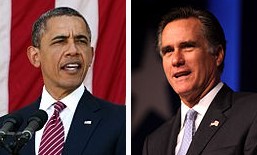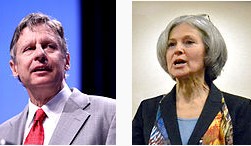
United States presidential election of 2012
Wikipedia | 2013-09-30 14:38
The next United States presidential election is to be held on Tuesday, November 6, 2012. It will be the 57th quadrennial presidential election in which presidential electors, who will officially elect the president and the vice president of the United States on December 17, 2012, will be chosen. Incumbent President Barack Obama is running for a second term during this election.His major challenger is former Massachusetts Governor, Republican Mitt Romney. Two other candidates have attained ballot access sufficient enough to mathematically win the election by a majority of the electoral college: former New Mexico Governor Gary Johnson, the Libertarian Party nominee;and Jill Stein, the Green Party nominee.
As specified in the Constitution, the 2012 presidential election will coincide with the United States Senate elections where one-third of the Senators will face re-election (33 Class I seats), and the United States House of Representatives elections (which occurs biennially) to elect the members for the 113th Congress. Eleven gubernatorial elections and many elections for state legislatures will also take place at the same time.
Primaries
Candidates with considerable name recognition who entered the race for the Republican presidential nomination in the early stages of the primary campaign included: Congressman and former Libertarian nominee Ron Paul, former Governor Tim Pawlenty, who co-chaired John McCain's campaign in 2008, former Governor Mitt Romney, who had done reasonably well in the 2008 cycle, and former Speaker of the House Newt Gingrich.
The first debate took place on May 5, 2011 in Greenville, South Carolina, with businessman Herman Cain, former New Mexico Governor Gary Johnson, Paul, Pawlenty, and former Pennsylvania Senator Rick Santorum participating. There was another about a month later, with Gingrich, Romney, former Utah Governor Jon Huntsman and Rep. Michele Bachmann participating and Johnson excluded. A total of thirteen debates would be held before the Iowa caucuses.
The first major event of the campaign was the Ames Straw Poll, which took place in Iowa on August 13, 2011. Pawlenty withdrew from the race after doing poorly, as did Thaddeus McCotter, the only candidate among those who qualified for the ballot who was refused entrance into the debate.Bachmann won the straw poll, and this proved to be the acme of her campaign.
A segment of the conservative primary electorate found Romney to be too liberal or moderate for their tastes, and a number of potential "anti-Romney" candidates were put forward, including Donald Trump, Sarah Palin, and Texas Governor Rick Perry, the last of whom ultimately decided to run. He did poorly in subsequent debates, and Cain and Gingrich came into the fore.
Due to a number of scandals, Cain withdrew just before the end of the year, after getting on the ballot in several states.
Johnson, who had been able to get into only one other debate, withdrew in order to seek the Libertarian Party nomination.
For the first time in modern GOP history, three different candidates won the first three contests. Although Romney was thought to originally have won in Iowa and New Hampshire, Santorum was declared the winner (by 34 votes) in Iowa a few weeks after the caucuses. Gingrich won South Carolina by a large and surprising margin.
A number of candidates dropped out at this time. Bachmann, who finished fifth in Iowa, withdrew after the caucuses. Huntsman withdrew after coming in third in New Hampshire, and Perry withdrew when polls showed him drawing low numbers in South Carolina.
Santorum, who had previously run an essentially one-state campaign in Iowa, took his campaign national and carried three more states on February 7. Romney won all other contests after South Carolina, including Florida, seen at the time as a major win over Gingrich.
The Super Tuesday primaries took place on March 6. With ten states voting and 391 delegates being allocated, it had nearly half the potential impact of its 2008 predecessor. Romney carried six states and Santorum three, while Gingrich won only in his home state of Georgia.Throughout the rest of March, 266 delegates were allocated in 12 events, including all of the territorial contests and the first local conventions that allocated delegates (Wyoming's county conventions). Santorum won Kansas and three Southern primaries, but was unable to make any gain on Romney, who remained the frontrunner after securing more than half of the delegates allocated in March.
On April 10, Santorum suspended his campaign, leaving Mitt Romney as the undisputed front-runner for the presidential nomination and Gingrich to claim he is the "last conservative" still actively campaigning for the nomination. Gingrich then withdrew on May 1 after a spokesman announced on April 25 that he would do so. On the same day as Gingrich's spokesman announced his future withdrawal, the Republican National Committee (RNC) declared Romney the party's presumptive nominee.Paul officially remained in the race but stopped campaigning on May 14. On May 29, Romney won the Texas 2012 Republican primaries; the subsequent accumulation of the state's 155 delegates was enough for him to clinch the party's nomination.
On August 28, 2012, delegates at the Republican National Convention officially named Romney as the party's presidential nominee.Romney formally accepted the delegates' nomination on August 30, 2012.
Americans Elect
Following the unsuccessful Unity08, Peter Ackerman started Americans Elect, non-partisan non-profit organization, with the objective of having the first online nomination process in American history. American Elect's motto was "Pick a president, not a party". No candidates met the requirements of online support set out by the organization to enter into its online caucus, so on May 17 the primary process came to an end without a nominee and no AE candidate will run for President in 2012. The online caucus site is now inactive except for a home page with the phrase "See You in 2013".
Share this page






















